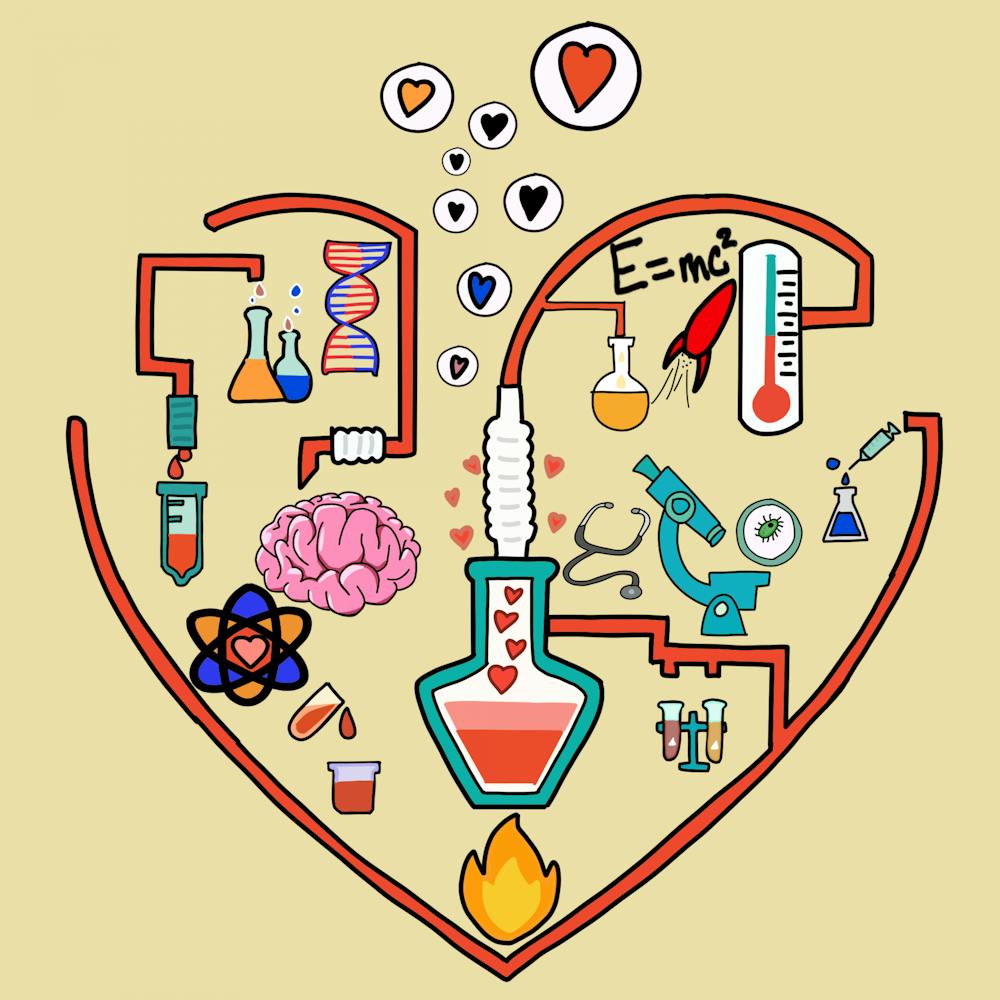As Valentine’s Day draws near, love will be celebrated in countless different ways, looked at from all points of view and shared amongst family, friends, significant others, adults, elderly and children alike. Everyone looks at love in their own way, and scientists are no different. They, too, have their own, technical definitions of love, defined in their field’s terms. It can be seen as a reaction in the brain, the positive to negative attraction of particles or stemming from the social interactions between two people. Within an institution such as the University, these nuanced definitions are everywhere.
For Psychology Prof. Robert Emery, love is defined by studying relationships and helping people to improve theirs. He refers to emotional reactions as occurring in constellations, depending on what stimuli is activated. As an example, he compares the relationships between infants and caregivers to that between significant others.
“Babies feel happy and secure — loved — when they’re in contact with their caregiver,” Emery said in an email to The Cavalier Daily. “When a baby cannot find their caregiver, they become angry … this is an attempt to bring the caregiver to them when the baby cannot find its way back.”
According to Emery, this behavior — known as reunion behavior — is also shown in romantic love. When he and his wife broke up while dating three decades ago, he stated that he left an angry message and called again to make sure that she had received his message.
“Like the wailing toddler, my anger wasn’t really anger but a form of reunion behavior,” Emery said. “I wanted her to engage with me, even if only in an argument.”
It is normal for couples to fight and be upset with each other. Other than the pain and feelings of betrayal, anger may be the motivation behind one’s actions.
“I always encourage couples who are fighting to pause and consider what might really be motivating their anger,” Emery said. “Anger may ultimately be motivated by longing or perhaps fear or pain or sadness or guilt.”
Asst. Nursing Prof. Katrina Debnam has a similar, human-level definition. Debnam has conducted much of her work with teenagers, arguably a time of many encounters with love and heartbreak.
“I use very relatable terms when I talk about love,” Debnam said. “Love is respect and honest and open communication and mutual trust and compromise.”
Assoc. Anthropology Prof. Ira Bashkow does not view love from an individual point of view but rather humankind’s broader need for and innate behavior towards it.
“Love is this force that drives us into this heightened kind of disposition to connect with another person,” Bashkow said.
Bashkow also addressed the romantic side of love, which he said is crucial to long-term structures in life, such as building families.
“[These long-term structures] remind us that we are not autonomous individuals but are deeply connected,” Bashkow said. “As an anthropologist, [love] is very deeply cultural that we learn to interpret, something universal.”
Paralleling the anthropological view that love is the basis for long-term structures of life, Assoc. Physics Prof. Cass Sackett brings the attraction between protons, or positive charges, and electrons, or negative charges, into the picture. As the building blocks of physical processes, Sackett considers their attraction to be a physics metaphor for love.
“That attraction is what makes everything we have work,” Sackett said. “That's why batteries work and motors and computers and everything else that we use. [It] is all basically running off that fundamental attraction between the two opposite charges.”
As a physicist, Sackett explained that gravity is one of the fundamental explanations of everything that occurs in the universe, a concept that can be compared to human relationships as well.
“Gravity [is the concept] that everything attracts each other, matter attracts matter,” Sackett said. “If you want to be romantic about it, nobody wants to be alone. Everything attracts.”
According to Economics Prof. Kenneth Elzinga, critics often claim that economics revolves only around buying, selling and making money, but in reality, the field is more multidimensional than that.
“Economists have their own language that rivals that of any poet or musician,” Elzinga said.
In a segment titled “The Economics of Love,” which Elzinga presented to his Economics 2010 class, he defines love to be “when two people have interdependent utility functions” — meaning love occurs when two people like the same things.
According to Elzinga, this definition can be used to express love the economic way.
“Whichever way the wind may blow, you will always be on my production possibilities curve,” Elzinga said.
Despite these multivarious definitions, Emery’s definition is perhaps one in which scientists from all disciplines can find truth.
“Love is a mystery that can never be defined,” Emery said.







